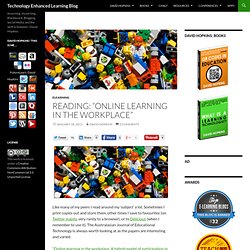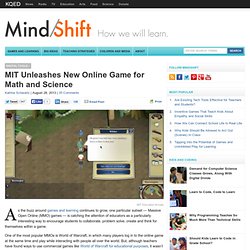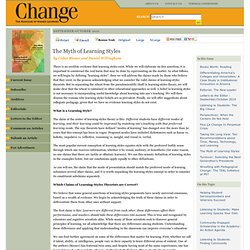

Cutting-edge ideas for system reform: What works is what's best. Minds of Our Own. Reading: “Online learning in the workplace” Like many of my peers I read around my ‘subject’ a lot.

Sometimes I print copies out and store them, other times I save to favourites (on Twitter mainly, very rarely to a browser), or to Delicious (when I remember to use it). The Australasian Journal of Educational Technology is always worth looking at as the papers are interesting and varied. “Online learning in the workplace: A hybrid model of participation in networked, professional learning” from Mary Thorpe and Jean Gordon covers different aspects of ‘work-based’, or rather ‘work-related’ learning, with a need to understand online participation as a “hybrid concept” that is a “reflection of offline roles, opportunities and pressures, as well as the usefulness, usability and relevance of what is online.” Do those who develop online materials for online students fully understand the importance of support, guidance, design, engagement, collaboration, assessment, timetable, social or professional pressures?
Science. I love the iPad but I love learning more. It is with mixed emotions that I begin my story. Whilst flattered to be asked to give an insight into the use of iPads in learning I feel somewhat of a fraud and perhaps a little misunderstood, you see I love the iPad but I love learning more. I have always embraced the learning potential of ICT, however it was not a relationship that began easily. Unable to make my O level timetable fit, yes I am that old, I was forced to take computer studies.
Two years later I had laboriously written a programme in MS Dos that told me whether I was a boy or a girl – not a labour of love or frankly a revelation! My relationship with MS DOS was short lived. My commitment to the use of ICT to enhance learning remained strong. however my first encounter with the iPad was unremarkable; I had an iPhone and was unimpressed by the hype that surrounded this new ‘champion’, in my view it was essentially just an iPhone with a bigger screen. Eighteen months ago my relationship with the iPad became official!
21st Century Learning. Learning Spy. iPad. MIT Unleashes New Online Game for Math and Science. Digital Tools MIT Education Arcade As the buzz around games and learning continues to grow, one particular subset — Massive Open Online (MMO) games — is catching the attention of educators as a particularly interesting way to encourage students to collaborate, problem solve, create and think for themselves within a game.

One of the most popular MMOs is World of Warcraft, in which many players log in to the online game at the same time and play while interacting with people all over the world. But, although teachers have found ways to use commercial games like World of Warcraft for educational purposes, it wasn’t originally designed with teachers in mind. Now, a group of researchers in MIT’s Education Arcade are trying to harness the power of MMO games to teach high school students to think like scientists and mathematicians. Radix, as it’s known, is aligned to the Next Generation Science Standards for biology, focusing on topics like genetics, evolution, ecology and human body systems. Taking the risk.
Change Magazine - September-October 2010. By Cedar Riener and Daniel Willingham There is no credible evidence that learning styles exist.

While we will elaborate on this assertion, it is important to counteract the real harm that may be done by equivocating on the matter. In what follows, we will begin by defining “learning styles”; then we will address the claims made by those who believe that they exist, in the process acknowledging what we consider the valid claims of learning-styles theorists. But in separating the wheat from the pseudoscientific chaff in learning-styles theory, we will make clear that the wheat is contained in other educational approaches as well. A belief in learning styles is not necessary to incorporating useful knowledge about learning into one's teaching.
What is a Learning Style? The claim at the center of learning-styles theory is this: Different students have different modes of learning, and their learning could be improved by matching one's teaching with that preferred learning mode. Resources 1. FASTLearningProgressions.